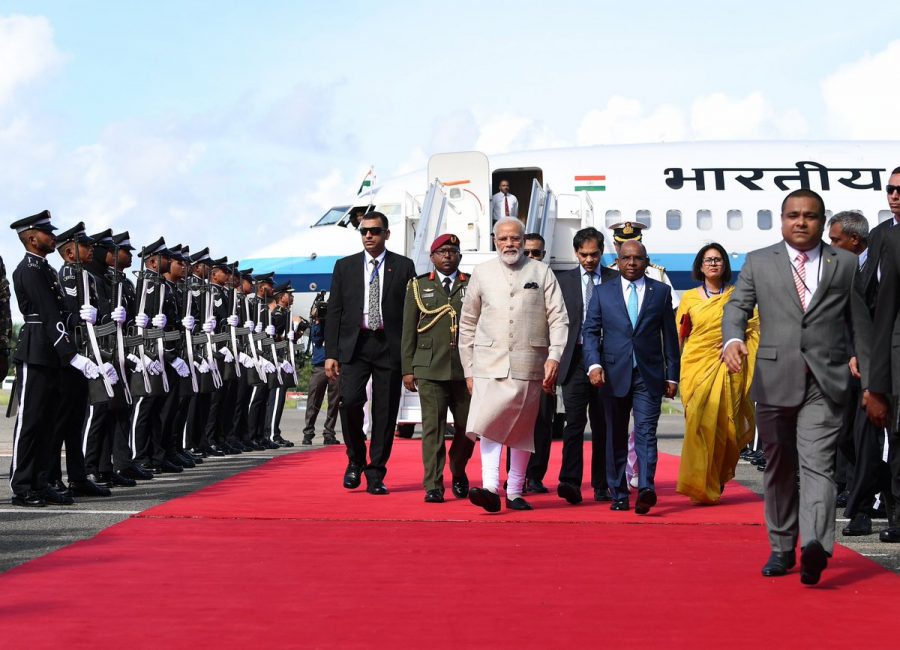
Modi's Male, Colombo visit bid to reclaim Indian dominance
PM Modi's visit to the Maldives and Sri Lanka appears to be the first steps of the newly-re-elected government to disentangle the South Asian neighbourhood from China

Prime Minister Narendra Modi’s visit to the Maldives and Sri Lanka appears to be the first steps of the newly-re-elected government to attempt disentangling the South Asian neighbourhood from the overpowering paws of the great Chinese bear.
Since Independence, in 1947, Delhi took for granted its hold over the South Asian region to the extent where others in the neighbourhood resented “big brother” India. New Delhi’s role in the breaking up of Pakistan resulting in Bangladesh and its deep say in the internal separatist conflict in Sri Lanka were among several actions that established its dominance in the region. But that is no longer the case. In the last decade or so, particularly since the last stages of the separatist Eelam conflict in Sri Lanka, the government in Beijing has made its presence felt in the region big time.
With India refusing to intervene in the Eelam conflict in 2009 when the Sri Lankan army was decimating the separatist Liberation Tigers of Tamil Eelam (LTTE), Colombo turned to China for help. Beijing liberally sent weapons and related aid which helped the Lankan government to defeat the LTTE. A grateful Sri Lanka then allowed China to develop several high-value projects including the Hambantota port. Similarly, the previous Maldivian government under Abdulla Yameen allowed China to invest heavily in land besides signing the Free Trade agreement with Beijing. Not just this, China has a naval presence in Sri Lanka and the Maldives, overriding Indian protests.
India’s role in Nepal under the previous Modi dispensation came in for much criticism, especially the blockade imposed by New Delhi to punish Kathmandu for not accommodating the wishes of the Indian-origin Madheshis who were demanding changes in the newly-framed Nepalese Constitution. The blockade of essential commodities from India pushed Nepal to China which was more than willing to help Nepal and win their gratitude.
And, the worst of India’s failure was the Doklam stand off with China where it ended up angering Beijing and irritating Bhutan. For a few days the situation looked pretty serious with some even fearing a conflict. Bhutan was apprehensive it had got caught in the power play between the Indians and the Chinese and was relieved when the standoff eased eventually. It was probably the first time that the region’s two giants had openly confronted each other in this fashion since the 1962 war between the two.
Bangladesh was probably the one country that India did not have serious problem with, thanks to the affable Prime Minister Sheikh Hasina. Pakistan which seemed set to have a warm relationship at the beginning of Modi’s term in 2014 quickly deteriorated into a situation where even the possibility of war was discussed after the attack in Kashmir’s Pulwama district. It must be said, however, that there was only a retaliatory Balakot strike.
Elections in Maldives causing the replacement of the pro-Chinese Yameen government there have solved a growing problem for New Delhi. The current government headed by Ibrahim Mohamed Solih, by all accounts, is India-friendly and that has grown stronger since the Modi government has promised to help by pitching in with $800 million to clear a large chunk of Male’s huge debt to China. Besides this, India is helping construct a cricket stadium, sanitary systems and beefing up its naval defence systems. Modi’s visit to Male first since his take over as prime minister for a second term is clearly a move that seems to consolidate the neighbourliness and send a political signal to Beijing that it is not easy to encircle India.
Modi’s visit to Lanka while intending to express solidarity with Colombo in the light of the Easter bombings is to ensure that Lanka remains with India given the public spat between President Maithripala Sirisena and prime minister Ranil Wickramesinghe. Sirisena’s links with the pro-China former president Mahinda Rajapakse worried Delhi but the issue did not blow up as was expected.The real challenge therefore for the Modi 2.0 government is managing relationships in the region with a long-term view as otherwise the situation can change in a jiffy given the fluid politics and the continuing dominant role of China in most of India’s neighbourhood.


